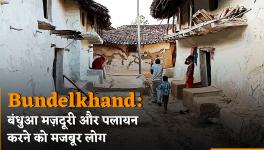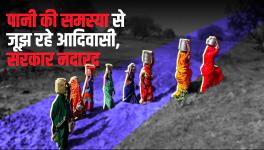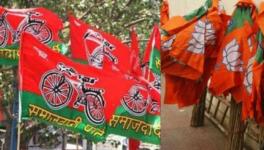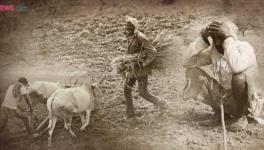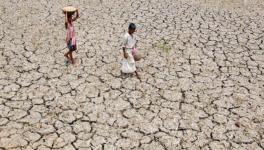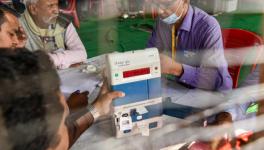UP: Farmers of Dhimarpura in Pahuj Reservoir Area Being Forced out for Jobs
Photo Credits: Ashish Tiwari
Dhimarpura, Jhansi: Their fields under water for most part of the year as they are in the storage area of the Pahuj dam, the farmers of Dhimarpura in Jhansi (Uttar Pradesh) have been waiting for years for some sort of compensation from the government. Until a couple of decades ago, they had other livelihood options. Not any longer.
Dhimarpura village is situated on the banks of the reservoir of the colonial-era dam that was redesigned in 2018. The dam had been built to fulfil the irrigation needs of villages in the Bundelkhand region and the drinking water needs of Jhansi city.
The irrigation department stores a certain amount of water in a specific area and this ‘reservoir area’ is claimed as land registered by the farmers.
Photo Credits: Ashish Tiwari
“Out of 10 acres of land, 8 acres are underwater and 2 acres are left on which I’m farming with no compensation or any help from the authorities," said 28-year- old Amar Singh, a third-generation farmer.
He recalls the days of his childhood when the ‘storage water’ was not stagnant and his father and his uncles used to work on more than 4 acres. When the water level rose, everyone would shift to fishing as an occupation but that, too, is fading slowly.
The contract for fishing is provided to the highest bidders by the department of fisheries and the individual who gets it does not allow the villagers to fish.
“Originally, everyone in the village used to fish in these waters, but now only those with a contract can do so. People with contract and an upper hand in hiring do not employ us due to the lack of fishery resources with us, like fishnet diesel boats, storage capacity etc., that migrant labourers from other states have and charge lesser amounts,” he said.
The unpaved roads of the village lead to half painted and white-washed houses with locks hanging on mandala-designed doors, narrating the story of every migrant labourer one often heard or read about in articles and reports. Every generation of the village is working hard as migrant labourers in metropolitan cities due to lack of employment opportunities in the region.
“There is no other alternative but to work as migrant labourers. Our lands are under water. We are not allowed to fish because of the contract system, but we need money to provide for our children’s education and daily needs,” said 23-year-old Rajendra Raikwar.
A few hundred metres from the neighbourhood, a green layer of fields can be seen near the banks of the reservoir, where farmers can be seen working on their leftover land.
“Farming gets delayed because of the water due to which debts get piled up, and this time it was difficult for me to cover the cost. I earned only Rs. 5 for one kilogram for the 35 kg of spinach I cultivated this season. I’m not able to provide education to my children,” said 54-year-old Laxman Das.
Most farmers in this village don't have any designated place or registered spot in the wholesale market (mandi) because of which they have to depend on middlemen and accept whatever they offer.
“They don’t allow us to sit in the mandi to sell our produce, so we have to manage with whatever the middlemen offer us,” said Das.
Bundelkhand is a rocky area, which means the soil cannot hold a variety of crops or commercial crops, because of which farmers have to resort to crops like wheat, pearl millet, sorghum and few vegetables that do not give much in return but take a lot of preparation and precise time to grow and cultivate.
But in Dhimarpura, the wheat crop that should have been out in December is still in the fields because of the continuous flooding and lack of fertilisers that should have been provided in October.
Mohan Raikwar, 60, is plucking out waste crops for cattle and says it will take him 15-20 days to clear out the field.
“To work as a labourer is not an option because no one is there to look after these fields. I’m looking for ways to earn for the next few months because I have people to feed at home,” said Raikwar.
The state irrigation department does not recognise the farmers’ right to their land because of an old agreement between the zamindars (landlords) and the government of India in 1938 in the designated area of the reservoir.
“We are looking for a way out for such areas, which are affected because of dams and reservoirs. But, we cannot alter the area of the reservoir as many villages and Jhansi city are dependent on that water for irrigation and daily use. It’s a decades-old system on which millions of lives are dependent,” said an official at the irrigation department in Jhansi division.
During every election, the people of Dhimarpura see political leaders visiting them and assuring a permanent solution to their problems, but nothing has changed, no matter which political party is in power.
This year, too, the villagers expect convoys of local leaders making a beeline for their village, but a suitable solution to their problem seems still a far cry.
The writer is a student at the Asian College of Journalism, Chennai.
Get the latest reports & analysis with people's perspective on Protests, movements & deep analytical videos, discussions of the current affairs in your Telegram app. Subscribe to NewsClick's Telegram channel & get Real-Time updates on stories, as they get published on our website.












